Blog
All Right Now! Engaging groups of children at storytime and in assembly, with help from Free, Queen and The Wiggles!
Date posted: Saturday 7th September 2013

In my early teens I spent a lot of time poring over photos like these and fantasizing. The main part of the fantasy was that I was an outstanding singer and guitarist who was onstage mesmerizing thousands of festival- goers. Each member of the crowd would be utterly enraptured by my stage presence. After the show I would be mobbed by fans, who would all buy my records as soon as they got home. (more…)
The pump don’t work ‘cause the vandals took the handles. Learning to talk and being autistic: desperately making sense of nonsense, with help from Bob Dylan and Soluna Samay
Date posted: Thursday 18th July 2013
Johnny’s in the basement mixing up the medicine
I’m on the pavement thinking ‘bout the government
The man in the trench coat, Badge out, laid off
Says he’s got a bad cough, Wants to get paid off
Bob Dylan, Subterranean Homesick Blues
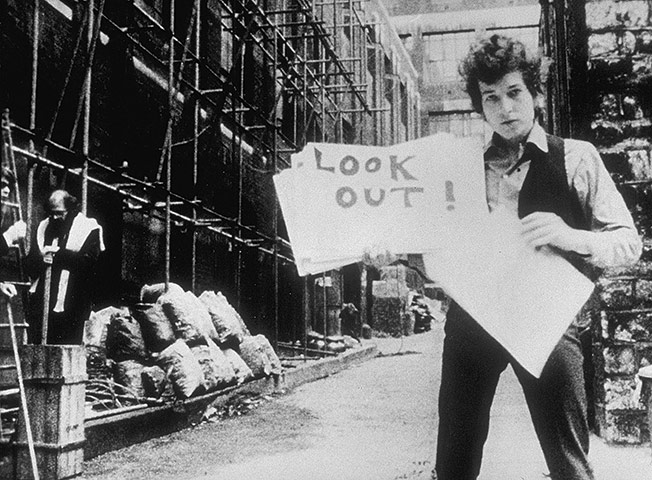
It’s official, this means nothing. For years people like me have been trying to work out what Dylan meant by lyrics like these. For years he has ignored everybody, and left us desperately trying to make sense of what he meant. Now Dylan has admitted that this song was a random collection of snatches of conversation overheard in bars and coffee houses. Maybe it’s sad, but we used to have great fun trying to learn the lyrics off by heart, even though we never had access to the printed words. It meant nothing to us then, apart from the certain knowledge that Dylan in this era of his life was effortlessly cool. Some of his lyrics just hit you as being totally meaningful: (more…)
Using small talk, chat, conversation and discussion to help children and adults become better communicators: with a helping hand from D.H. Lawrence and Britta and Shirley from Community
Date posted: Friday 12th July 2013

Britta and Shirley: big talk + small talk= zero communication
Sometimes I can sit in a room full of people and feel as if I am the loneliest person in the world. Actually that’s a load of melodramatic tosh: I live in France and am surrounded by French people who speak no English. As my French is rudimentary, I have to stick to very basic subjects, or sit quietly and listen in to the conversations going on around me. I have to work hard to be included: by leaning forward to listen in, make eye contact with the person talking, and smile or frown (if I can get the gist of what is being said).
However I sometimes long to be able to talk about subjects that are important to me; like the latest episode of Community. I want to share with my neighbours why this cult US comedy series set in, Greendale Community College, is so funny. It’s partly the characters, including Abed, the teenager with Asperger’s who seems to know more about human behaviour and communication than the so called ‘normal’ members of his study group. But my favourite is Britta, the ex-anarchist international campaigner, foot model and waitress. She desperately wants to ‘connect’ with other women, but doesn’t know how. Jeff Winger, the cool and aloof heartthrob ex-lawyer, gives her some advice: “Women love to group, so spend time in the ladies’ room making small talk while fixing your makeup.”
Britta heads off to the bathroom and meets self-confessed gossip addict Shirley. Shirley starts to tell Britta about her latest makeup party she plans to host with her mom. This gives Britta the heads up to launch into a tirade against international cosmetics companies who are denuding the rainforests and exploiting the women of remote tribes in the Matto Grosso. Shirley switches on the hand dryer and leaves, while Britta keeps on talking. It’s comedy brilliance with a social message (at least that’s how I justify watching it). Britta is not able to make a connection with her peers because she is always engaging in big talk, without being able to have fun chatting about small subjects.

(Big talk + big talk) + duffle coats = lots of discussion
This reminds me of myself when I left my all-boys’ school and started attending a local college to do my A Levels. I was very keen to connect with girls, but was a bit lacking in experience. Just before I left school, I spent a weekend with my brother, who was at university. I looked around at what the cool guys were doing. Many of them wore duffle coats, and had paperbacks sticking out of their pockets. These were carefully turned round so that you could read the author and title. I guessed the idea was that a chick would notice that you were reading Carlos Castaneda, or Hermann Hesse, or even Thomas Mann, and start talking to you about your cool choice of literature.
As soon as I left school I bought a duffle coat and copies of Lord of the Rings and War and Peace. I was going to attract some really literate chicks and spend hours talking about my favourite authors. Bad mistake: duffle coat pockets are designed only to take paperbacks of 200 pages or less.
So each day I tried a different book from my mum’s bookshelves: Death in Venice… Death in the Cathedral… Death of a Salesman… even Death on the Nile. Nothing. Not even a condescending look. What was going on?
A girl in our English Literature class was extremely quiet. Actually she was completely silent. Every morning, on my way to college, she would get on my train, and if we were sitting opposite each other (which I always tried to engineer) she would avoid eye contact with me. If our eyes did chance to meet, then she would blush and pointedly look away. I must admit, I found her silence quite fascinating. Why didn’t she speak? When she did talk, what would it be about? Would she give me her phone number? We were sitting opposite each other one day on our way back from college, when there was a big jolt, and the train came to a sudden halt. It was in the days before in-train announcements, so no one knew how long we would be stuck waiting. After 10 minutes of embarrassed silence, Penny (for that was the silent angel’s name) suddenly spoke: “You must be a very fast reader.”
I was a bit stunned. I went red and avoided eye contact. “You see, every day you have a different paperback in your pocket. Finally you have chosen one that I like. Do you like Women in Love? Do you think Lawrence is making a statement about war and inherent masculine aggression in the scene where the two men wrestle in front of the roaring log fire? And do you agree that Lawrence uses the character of Rupert Birkin to expound his ideas, including on gender?” I had to admit, because Penny clearly had me sussed and was enjoying teasing me, that I had only read the blurb on the back of the book, and by the time we reached the station I had confessed that I was no match for Penny on the literary front and was only using the books as a ‘babe magnet’. My game was up, but the genie was also out of her bottle. Not only did I get her phone number, but she asked me to go with her to see the Ken Russell film of Women in Love. Which was a bit of an eye-opener, I can tell you.
I got to know Penny quite well. A lot of people thought that, like Britta, she was aloof and stuck-up. But I think that she was just very very shy, and not able to engage people in small talk and chat. She much preferred to have discussions on topics about which she had some in-depth knowledge. Then she could ask questions, give answers, expand ideas and make connections with other like-minded people. Unfortunately, try as I might, I could not get excited about the life and works of David Herbert Lawrence, and Penny felt equally cold about Tolstoy and Tolkien. She went on to gain a chair at a red brick university, while I am sitting on a chair in France writing a blog about her.
Where is this all leading? Well I think that many children, teenagers and adults who are very quiet, and unhappy about being so, need support to understand the different types of verbal interaction that we humans sometimes engage in. And the adults and peers who want to help them need to be clear too. Here are some definitions:
-
Small Talk: the small comments we make to complete strangers, to fill a silence: e.g. at the bus stop, saying, ‘Looks like the sun is trying to come out.’ Apparently not everyone engages in this type of talk (I have been told that Germans don’t do small talk.)
-
Chat: talking briefly about neutral topics, like the weather, shopping, last night’s TV. No important information is passed on. We are just talking for the pleasure it gives us (we hope).
-
Banter: what mainly men and teenage boys who know each other well do, to connect with each other. It’s usually good-humoured and has a lot of sarcasm involved; e.g. “I see Spurs did the usual last night” (i.e. drew 1-1 with Wigan, even though they beat Man Utd 2-1 on Saturday). To which the other man responds, “Yeh, whatever.”
-
Conversation: where two or more people share ideas about a topic of shared knowledge that is important (e.g. teenage girls talking about boys and shoes. I’m not being sexist: these are popular topics.)
-
Discussion: where two or more people share ideas in-depth about topics that are really important to all concerned; e.g. why the Fat Controller locked Thomas and the other striking engines in their sheds, and brought in a load of blackleg rolling stock from another company, until those involved in legitimate industrial action were forced back to work . (I kid you not; I had this conversation with a six-year old once.)
I often think of conversation as being like dancing: some people do it naturally without thinking, while others can do well with experience. Some, who develop quite significant anxiety, will need a lot of coaching and will develop their confidence if shown the right steps by a sympathetic partner: preferably one who is more interested in dancing with you than the small injuries that you inflict as you tread on her toes.
It’s very important for adults to know about the different types of interaction that are possible, and to be able to work out, when you are getting to know someone, what mode you are in, and what is appropriate. At a bus stop in Northern Ireland, for example, it is very likely that a stranger will say to you, “How are you?” That’s the local way of saying hello, and possibly an invitation to engage in small talk. I wish I had known this when a man covered in tattoos on a railway platform made eye contact with me and felt inclined to ask me how I was doing. I explained that I was feeling a bit bloated because I had been eating far too much bread recently, and I had just drunk some fizzy water which was making me feel a bit gassy. Fair play to him, he could tell I was out of my depth, as his next question was, “I take it you’re from England?” He’d met my type before, and he kindly steered me towards small talk about the weather. As we sat opposite each other on the train, we struck up a conversation about children, and I was able to give him some guidance about his wee boy of three who had just developed a stammer.
We will probably all know adults who are on either end of the interaction spectrum: those who only talk when they feel that they have something to say, and feel most comfortable when they are giving you a lecture, as compared to people who constantly engage in small talk, with lengthy bits of chat thrown in. I have met children who are judged to be extremely quiet, who are able to talk to an adult at length about a subject they know a lot about. It’s just that their specialist subject may not be part of the curriculum, or they might be worried that you might not be interested.
Britta and Penny were most comfortable with discussion, but it may have been helpful to support them to identify other types of communication, and to encourage them when they have a go at small talk and chat. Likewise with children who feel very uncomfortable about talking in groups: we can find out what their specialist subjects are, and find ways of including these in talk. So if a boy or girl from a farming family, for example, has a fascination with farm vehicles, we can find books on the subject and share these with them, and plan to include other children in the conversation/discussion and play. It can be helpful for teenagers who are finding it difficult to relate to their peers to learn about the value of small talk, chat and conversation.
Some people never make it down to the level of small talk and chat, but I live in hope that my French improves enough so that I can get to the lofty height of conversation!
For more information about supporting quiet children and those with selective mutism, visit www.talk4meaning.co.uk
Supporting Quiet Children: exciting ideas and activities to help ‘reluctant talkers’ become ‘confident talkers’ by Maggie Johnson & Michael Jones, is available from www.lawrenceeducational.co.uk or from Amazon.
Supporting children’s behaviour development. Making ‘behavioural mistakes’ and ‘good choices’ (Part 1): with help from The Rolling Stones and Rob Long!
Date posted: Sunday 7th July 2013
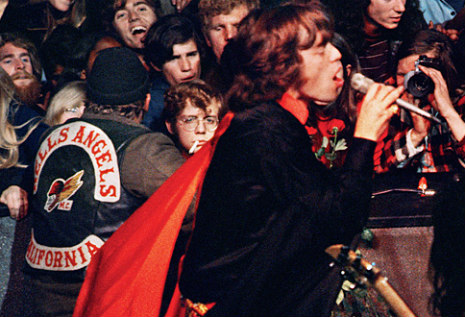
I have taken part in some bizarre experiences in schools in my time, but by far the weirdest was a ‘bonding session’ at a primary school I was involved with in the late 1980’s. A new head teacher had been appointed, and on the first day of the autumn term he decided that we should all take part in a ‘getting to know each other day’. Looking back on it, this guy was a bit ‘left field’. We later found out that he had spent the summer involved in an ‘Iron John’ experience in California, which included spending time in a sweat lodge and banging tom toms in the wilderness with a load of like-minded menfolk. The first activity of the day was called ‘Give yourself a new name: start a new life’. The idea was that you choose a creature or natural object that reflects your personality, and then name yourself after it, as was traditional among Native Americans. I thought that Raging Bull sounded great, but was maybe a bit too aggressive for a primary school. Wild Stallion was out (not a good image). Likewise Lone Pine (a bit aloof and not a team player). The teacher next to me was a bit of a wag, and decided to help me. “Mike, you’re very quiet most of the time, but in meetings sometimes you put your head above the parapet and say something outrageous. Then you go back inside your shell and spend the rest of the week worrying and apologising to people. You could call yourself Turtle’s Head.” So I did, and it stuck. I didn’t realise until a decade later, when I saw the second Austin Powers film, why everyone thought my new name was so funny, (if you don’t already know, you can find out for yourself on Urban Dictionary, but be prepared to be disgusted!) (more…)
In praise of adults working with babies and toddlers, with help from Joni Mitchell, Graham Nash and Lisa Hannigan
Date posted: Wednesday 3rd July 2013
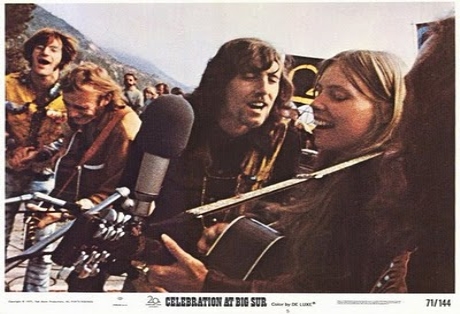
Willy is my child, he is my father
I would be his lady all my life.
And I feel like I’m just being born
Like a shiny light breaking in a storm
There are so many reasons why I love him.
Willy, by Joni Mitchell, from her album Blue
Young, Gifted… and Stuck (Part 2): or helping children with ongoing spelling problems, assisted by Crosby, Stills, Nash and Young, Joni Mitchell and Blondie!
Date posted: Sunday 23rd June 2013
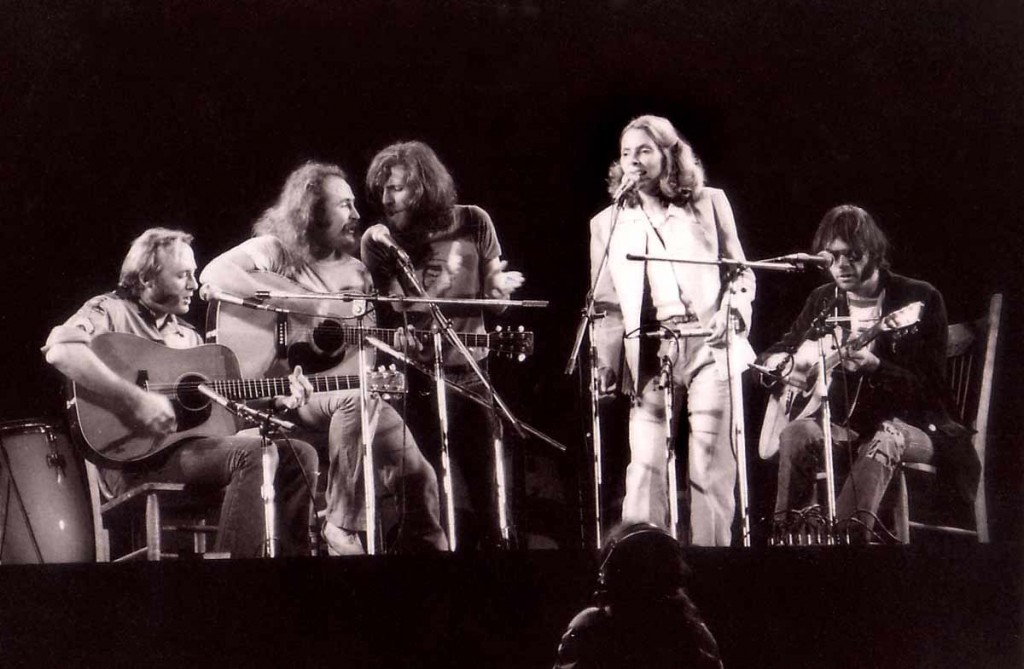
Crosby, Stills, Nash & Young with Joni Mitchell: singing to a lost generation?
I’m part of a lost generation. I was too young to be a hippy and too old to be a punk. I turned 13 in 1970 and stood on the platform at Guildford railway station watching trainload after trainload of hippies heading to the Isle of Wight festival. There they would see countless legends such as Jimi Hendrix, the Doors, The Who and Joni Mitchell. Being a hippie seemed to make perfect sense to me, and I wanted to be like them. All you needed to do was grow sideburns, wear a tie die t-shirt and sit on the grass, singing Woodstock by Joni Mitchell, listen to Crosby, Stills, Nash and Young on your portable cassette recorder , while talking about changing the world, though not actually doing anything about it. I turned 16 in 1973 and just about had sideburns. I sneaked out of school and watched Woodstock at the local cinema. After that being a hippie made even more sense: you needed to wear very bright clothes, have a chick, and say ‘far out man‘ a lot. Rock and roll was still important, as was looking cool. I turned 17 in 1974, and saw Crosby, Stills, Nash and Young at Wembley Stadium. They sang Woodstock with Joni Mitchell. But there was a change in the air: Joni wore a smart white suit and sang jazzy, discordant songs with Tom Scott and the LA Express. The Band did a set, but they were boring. Practically every musician onstage that day was over 30, but they really could sing and play (apart from Neil Young, who was very drunk.) (more…)
Young, Gifted… and Stuck (Part 1) or how to support children with problems with maths, with help from Bob Marley and the Wailers and Marcia Griffiths
Date posted: Monday 10th June 2013

Young, gifted and black!
We must begin to tell our young,
There’s a world waiting for you,
This is a quest that’s just begun.
When you feel really low,
Yeah, there’s a great truth you should know,
When you’re young, gifted and black
Your soul’s intact.
To Be Young Gifted and Black by Nina Simone & Weldon Irvine
You can get it if you really want,
But you must try, try and try,
You’ll succeed at last.
You Can Get It If You Really Want by Jimmy Cliff. (more…)
“Help me with my mind!” Or keeping the differences between boys and girls in perspective, with help from Ozzie Osbourne and Black Sabbath
Date posted: Thursday 30th May 2013
“Finished with my woman,
‘Cos she couldn’t help me with my mind.
(Refrain) Can you help me occupy my brain? (Whoa whoa, du du du)”
From Paranoid by Black Sabbath

Sabbath circa 1970
I don’t mind admitting that when I was 14 I was big fan of Ozzie Osbourne, Tony Iommi, Bill Ward and Geezer Butler, aka Black Sabbath. Their image, music and lyrics seemed to have been designed to appeal to the spotty adolescent male. Very little seems to have changed since they first emerged from the UK’s industrial heartland in the early 1970s. Recent concert footage shows that they still appeal to 14 year old boys, as well as the ‘inner 14 year old’ of men in their fifties. I moved on from Sabbath when Ozzie ate a live bat on stage, (legend has it that someone threw an unconscious bat on stage. Ozzie thought it was rubber so bit its head off). After that I took to listening to more ‘progressive’ bands like Yes and King Crimson. Though I’m clear that Sabbath and their ilk were a passing phase for me, I’m still very confused about gender. I’m not talking about my lingering fondness for the music of Bowie in his Ziggy Stardust and Aladdin Sane phases, but about what to think about boys and girls learning. (more…)
“My castaway this week is…”: Or having a real conversation, with help from Kirsty Young, Aung San Suu Kyi, and Michael Rosen
Date posted: Sunday 26th May 2013
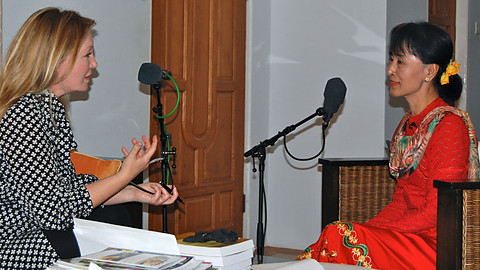
I have a bit of a fantasy that one day I will appear on BBC Radio 4’s Desert Island Discs, where Kirsty Young asks me about the eight records I would take with me to my desert island, along with my favourite book and one luxury item. During the programme Kirsty gently quizzes me about my life, in her beautiful Scottish accent, and I explain each record‘s significance for me and respond to her charm by revealing insights into my life and times. (more…)
She’s buying a stairway to heaven: or how to help children wonder, with help from Led Zeppelin
Date posted: Sunday 19th May 2013

The word wonder has several meanings. School assemblies are supposed to fill children with a sense of ‘awe and wonder’. Children should leave an outstanding assembly feeling thrilled and with a sense of the greatness of the world and the power of the spiritual life. As a teacher I would strive to achieve this state in the massed ranks of children, but they often left my assemblies on a Monday morning wondering what it had all been about. So in that sense, the word wonder involves thinking about confusion. (more…)